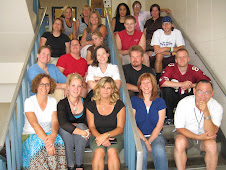Because of I'm feeling very inspired and ambitious, right now I would predict that my classroom will look completely different in the fall. My students and I will be writing every day, and a lot of that writing will be low stakes, just like what we participated in the during the SI. I'm hoping that they find some intrinsic motivation from this writing. How much I respond to this writing is yet to be determined, but I don't think it will be much.
From the very beginning of the year, I plan to implement Writer's Workshop at least two days a week, and an integral part of that will be small writing groups. (Thanks to Keri and Joe's demos and my own SWG from the OWP.) Circular journaling (Genesis) will also come into play with my small writing groups. In our SWGs we will use some of the reformulation strategies introduced by Casey. Yes, scissors and glue will be involved. Students will create their own Writing Territories at the beginning of the school year, and that will provide an ongoing reference for them as they choose topics, genres, and audiences for their writing during WW. (As a side note, a conversation with Elise has inspired me to consider having my students write as a gift for an assignment. That would actually tie in well with Melissa's oral history project. If my students interview someone and write a personal narrative about their life, that would make a really special gift as well as an important lesson about writing for audience.)
I'll also use many ideas from demos during mini-lessons for my Writer's Workshop. Image and conscious grammar within the context of student writing will be taught in small increments and referenced back to throughout the year (Elise and Kathleen). Michelle's giant post-it poster to review figurative language would also tie in with a mini-lesson.
In addition, there are some specific writing assignments I would like to try with my composition students. Because I'm excited to try some of these things on my own, it will give a great chance for me to write with my students. Some of these assignments include parallel poetry (Chris), episodic fiction and creating characters from objects (Joshua), writing letters to "monsters," (Katrina), and responding to poetry through some form of artistic creation (Jenner). I was already planning to do a multi-genre identity project at the end of the school year with my seniors, and there were some projects that I think will tie in nicely with this, including Dana's footprint poem, Stacy's recipe, and Rachel's life map. These are all assignments or activities that I wouldn't have considered otherwise, and by seeing them implemented, I feel like I can try it with my students, too.
Some great ideas about the reading and writing connection will be helpful in my Novels course. I liked the TS, TW, TT connections that Sharolette reviewed for us, and the questions she provided for the reading will be helpful with that. Sarah's Story Impressions will also be a great way to introduce a new piece of literature. I'm sure there will be films to incorporate with my Novels course, and thanks to Debra, my students will be challenged to look beyond the surface meaning of media. Perhaps I'll even tape a third eye to my forehead! Faith's post-it activity would also provide a great way to review literature when we're finished reading during that class.
Okay, so maybe I'm sounding like my expectations for myself are pretty high. They are. I will promise myself now to do as much as I can, but I will not be disappointed if I do not accomplish everything in just one year. Change often takes time. I'm thankful to have this wonderful support network of other teachers who have inspiring ideas that I can utilize. And I will keep writing because, after all, I am a writer.
Friday, July 11, 2008
Subscribe to:
Post Comments (Atom)








No comments:
Post a Comment